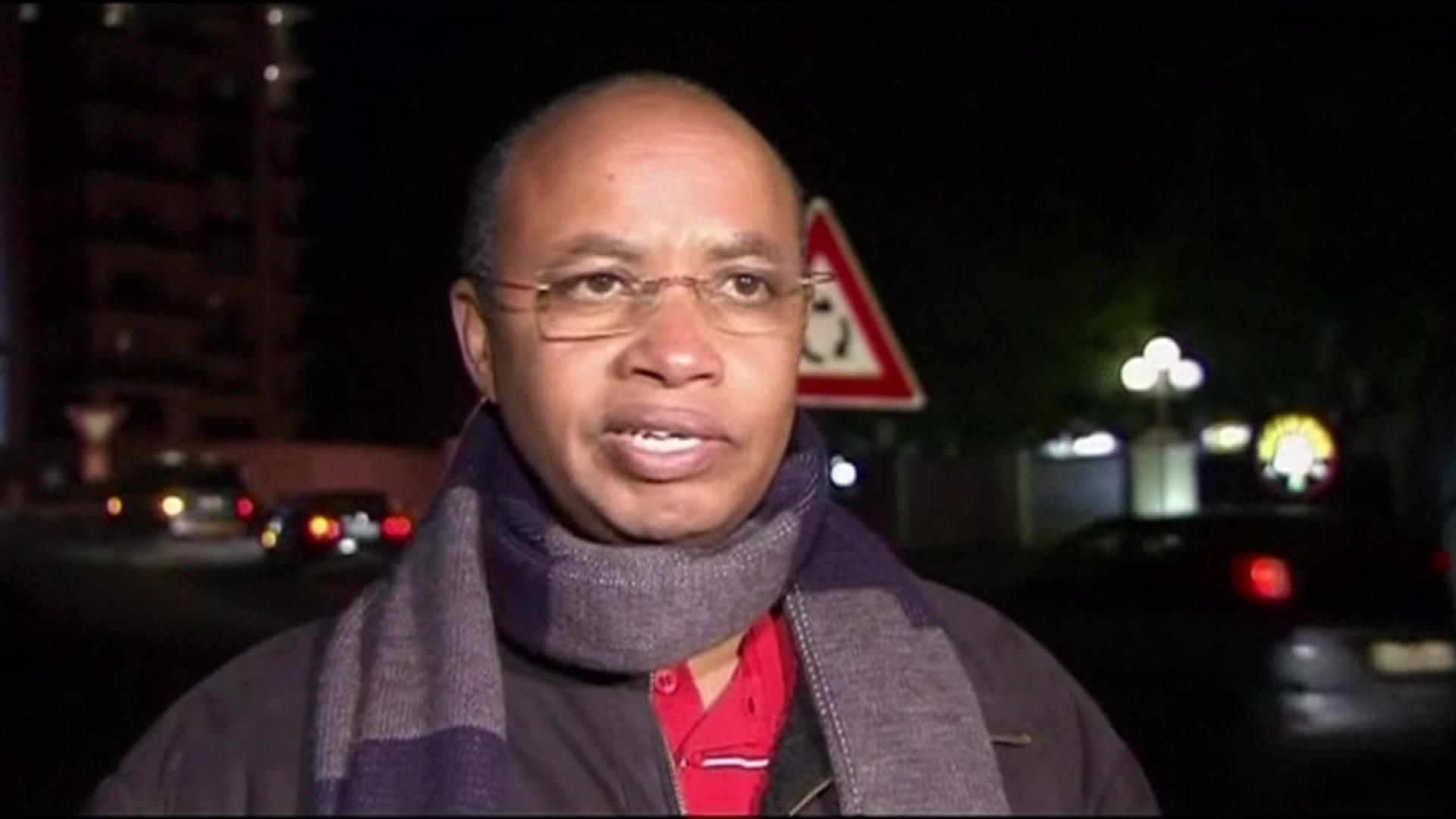Patrick Karegeya: Mysterious death of a Rwandan exile
- Published
Watch Gabriel Gatehouse's Newsnight film on Patrick Karegeya's murder
A murdered former Rwandan intelligence chief was advising South African and Tanzanian intelligence as they prepared to send troops to the Democratic Republic of Congo to battle the Rwandan-backed rebel group M23, BBC Newsnight has learned.
On New Year's Eve, Rwanda's former chief of external intelligence, Col Patrick Karegeya, went to his suite at the Michelangelo Towers - an expensive hotel in Johannesburg's business district -to meet an old informant.
The friend, Apollo Kiririsi, appears to have been used as bait. The killers themselves are thought to have rented a suite across the corridor. It is not clear exactly who or how many they were, but Col Karegeya seems to have put up quite a fight.
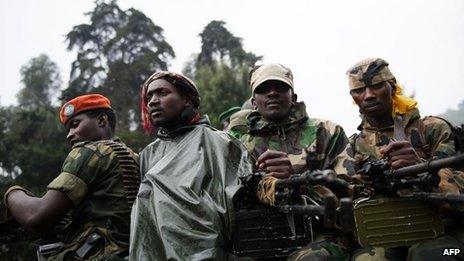
Rwanda denies backing the M23 rebels who were defeated last year
David Batenga, Col Karegeya's nephew, who discovered the body almost 24 hours later, says: "There had been a bit of scuffle, everything was just a nightmare. We found the towel, and the towel was full of blood, and the rope. They literally used a rope to hang him tight."
Dark secrets
Col Karegeya was once one of the most powerful figures in Rwanda. He fled to South Africa in 2008, after falling out with the regime. There he helped set up an opposition movement, the Rwandan National Congress.
His friends and family are in no doubt that he was murdered on the orders of the Rwandan president.
"There are so many reasons why he may have been murdered," says Mr Batenga. "Because of the job he did and because of what he knew, given his position for all those years when he was part of the Kagame regime."
Almost certainly, Col Karegeya would have known some dark secrets from his time at the heart of the Rwandan establishment. But even in exile, he maintained close contacts inside Rwandan intelligence. His murder may have had more to do with whom, rather than what he knew.
The BBC has learned that from around the middle of 2013, Col Karegeya held a series of meetings with South African and Tanzanian intelligence officials.
At the same time, South Africa and Tanzania were sending troops into the Democratic Republic of Congo, as part of a United Nations force battling the M23 rebel group, which is widely believed to have received support and funds from Rwanda, although this is denied in Kigali.
Could Col Karegeya's meetings have contributed to the defeat of a Rwandan proxy army? And could that, in part at least, explain his death?
Shortly after the murder, Rwanda's President Paul Kagame did little to distance himself from the killing, while officially denying any involvement.
"You can't betray Rwanda and not get punished for it," he told a prayer meeting on 12 January. "Anyone, even those still alive, will reap the consequences. Anyone. It is a matter of time."
Living in hiding
Col Karegeya's death served as a stark warning to his colleagues in the Rwandan opposition, in particular Gen Kayumba Nyamwasa, the former chief of staff of the Rwandan Armed Forces.
Six men, three of them Rwandan, are currently on trial in Johannesburg, accused of his attempted murder in 2010. Since then, Gen Nyamwasa has survived two more assassination attempts, the most recent earlier this month.
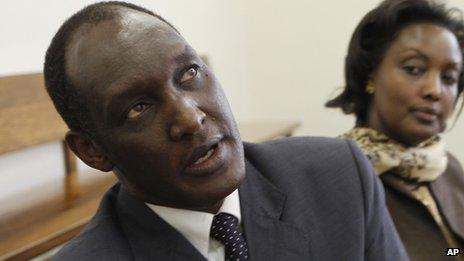
Gen Nyamwasa has survived two assassination attempts
And so he is in hiding, living under South African state protection.
"I ran away from somebody I thought was going to harm my life. And that person is the president of Rwanda," he says at a secret location outside Johannesburg.
"[President Kagame] said that Patrick and I are like flies, and if it requires him to use a hammer to kill a fly, he will do it."
I ask Gen Nyamwasa, given their formerly close relationship, whether he had ever considered President Kagame as a friend. He is emphatic.
"Never. First of all he is a very violent person, beating people, very many times in my life I have seen him do that," he says.
Gen Nyamwasa also maintains close ties to serving officials in the powerful Rwandan military. He concedes it is possible President Kagame considers those contacts a potential threat to his rule.
But history and the dark shadow of Rwanda's genocide also hang over this murky affair.
Rocket attack
Gen Nyamwasa accuses President Kagame of ordering the rocket attack on the aeroplane carrying Rwanda's former President Juvenal Habyarimana on 6 April 1994, the event that triggered the genocide.
President Kagame has furiously denied any involvement, saying the attack was ordered by Hutu extremists as a pretext to begin the mass killings in which 800,000 Rwandans died, most of them ethnic Tutsis. Gen Nyamwasa declined to offer any evidence for his accusation.
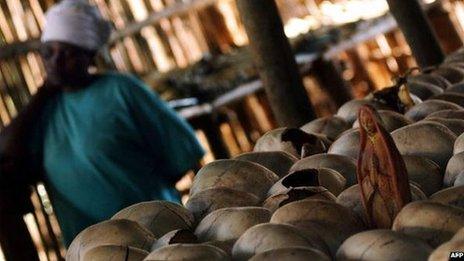
Some 800,000 people were massacred in 100 days during the Rwandan genocide
In the aftermath of the genocide, President Kagame's Rwandan Patriotic Army was accused of carrying out mass killings of Hutu civilians. Again this is a charge that is strenuously denied by the Rwandan president. Indeed the topic is taboo in Rwanda.
But here, Gen Nyamwasa, as former head of the Rwandan military, is on firmer ground.
"There was no deliberate intention to carry out a genocide against the Hutu," he says. "But talking about people dying in war, and in particular some Hutus dying in war, undoubtedly yes, they did.
"The issue is [President Kagame] says nobody died. And yet people know either a parent a wife or a child who died. The circumstances should be explained. And then people can talk about reconciliation. Because in Rwanda, we don't have angels and devils. We have a situation that is in between."
You can watch the interview in full on Newsnight on BBC Two, or later via the Newsnight website or BBC iPlayer.
- Published12 March 2014
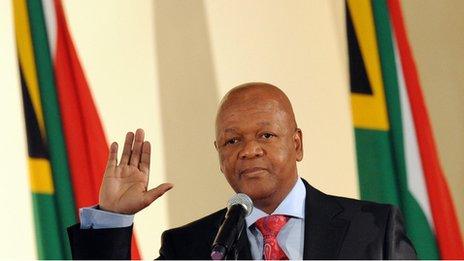
- Published7 March 2014
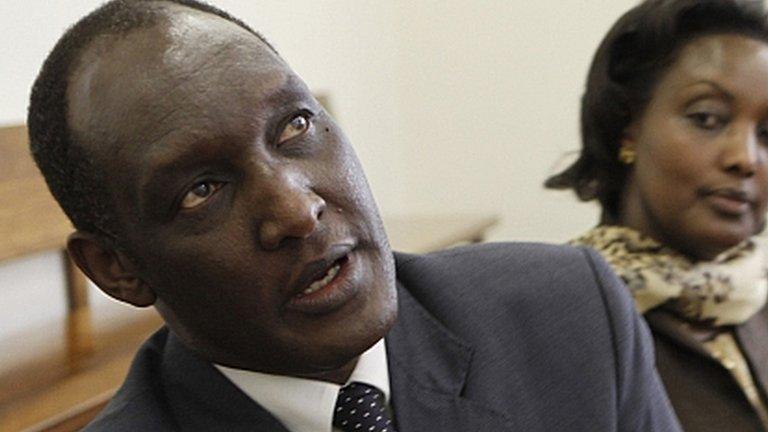
- Published15 January 2014
